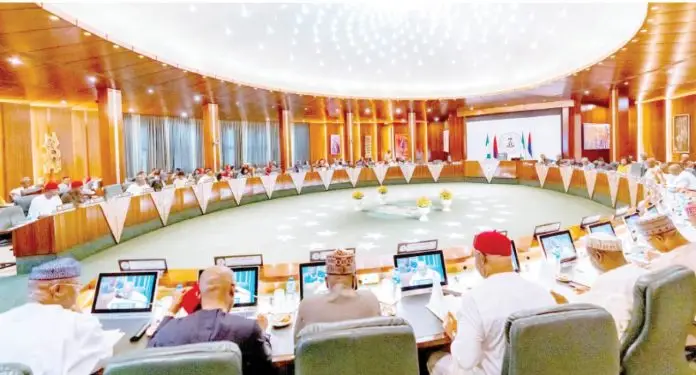Following a National Economic Council (NEC) meeting yesterday, President Bola Ahmed Tinubu and the governors of the 36 states of the federation remained silent on the subject of the minimum wage.
The issue has been dragging on since Tinubu took office on May 29, 2023, when the fuel subsidy was removed. Since the N30,000 minimum wage agreed upon in 2019 expired, millions of Nigerians and members of organized labor had anticipated that the federal government and the states would take a stand.
The NEC meeting, which was required to be chaired yesterday, was attended by Vice President Kashim Shettima.
This gave astute observers of the development hope that the threshold for the new minimum wage would likely be raised.
Read Also: Governors promise workers a higher minimum wage.
As you may remember, following roughly five months of meetings, the 37-member Tripartite Committee on National, Minimum Wage—headed by former Federation Head of Service Bukar Aji—sent President Tinubu its report a few weeks ago.
President Tinubu had declared that a consensus had been reached and that a proposal would be brought before the National Assembly in his Democracy Day speech on June 12, 2024.
The president was challenged by organized labor, who countered that they were not aware of any agreement.
At roughly the same time, the Nigeria Governors’ Forum (NGF) rejected the N62,000 minimum wage initially recommended by the federal government, stating that certain states would have to borrow to pay salaries if the sum was enforced.
Currently, N250,000 is the minimum salary that the Trade Union Congress (TUC) and the Nigerian Labour Congress (NLC) are demanding.
The memo regarding the proposed new minimum wage for workers, in the nation was rescinded by the Federal Executive Council (FEC) on Tuesday.
This is required, according to Mohammed Idris, Minister of Information and National Orientation, to enable the president to confer more with other interested parties on the matter, since it affects municipal, state, federal, and organized business sectors.
The most recent occurrence
The minimum wage was not discussed following yesterday’s NEC meeting, which was held at the Presidential Villa in Abuja. This was because the governors who briefed the press did not take questions.
Rather, N10 billion in ‘one-time’ funding for the purchase of buses and a CNG ‘uplift program’ was granted by President Tinubu for the states and the Federal Capital Territory (FCT).
The ‘National Construction and Household Support Programme’ was a recent initiative that included this.
As indicated by a statement made public by the president’s spokesperson, Ajuri Ngelale, the plan consists of ‘providing N50,000 uplift grants,
each to 100,000 families per state for three months, and provision for labor unions and civil society organizations.’
He stated that ‘A deployment of N155 billion for the acquisition and sale of various consumables to be dispersed all around the country.
In addition to providing immediate financial relief for Nigerians, the statement stated that the program was anticipated to increase agricultural productivity and enhance the economy by generating possibilities in the actual industries of manufacturing, construction, and agriculture.
Projects involving road infrastructure, like the Trans-Saharan Highway, which connects Enugu, Abakaliki, Ogoja, Benue, Kogi, Nasarawa, and Abuja, and the Lagos-Calabar Coastal Highway, are now under construction.
On the other hand, President Tinubu approved full counterpart financing for the Lagos-Kano Standard-Gauge Railway’s Ibadan-Abuja segment, which will pass through Lagos, Ogun, Oyo, Osun, Kwara, Niger, Abuja, Kaduna, and Kano,
as well as the Port Harcourt-Maiduguri Railway, which will pass through the states of Rivers, Abia, Enugu, Benue, Nasarawa, Plateau, Bauchi, Gombe, Yobe, and Borno.
‘The Sokoto-Badagry road initiative, given that some of the states it will pass through are crucial to the nation’s agricultural viability, has been given particular priority,’ the statement read.
Speaking to the governors at the NEC meeting, President Tinubu asked them to collaborate in order to satisfy the demands of the populace and pledged to supply the necessary resources to guarantee that Nigerians were spared from suffering.
‘To address the demands of our people, we must collaborate among our states to implement the crucial reforms that are necessary.
‘Time is the most precious resource for humanity.’ There’s always more to have of it. It is becoming later.
‘We need to produce right now, but we are ready to help our farmers throughout the year with solar-powered irrigation systems.
We need to generate the Our people must grow the food they eat, which will need intentionality and cooperation from National Economic Council (NEC) members.
Producing food of the highest caliber for our people to eat, purchase, and sell is the most essential thing we do. ‘Additionally, we create jobs when we manufacture it.’
And that’s before we export the surplus to create wealth. We are capable of doing this for the people of Nigeria.
‘In what way and to what extent do you require my support? I’m ready to supply it. But we have to get the desired outcome. We have to meet our goals on all fronts.
Within seven days, please send to my office your report back from your consultations, President Tinubu said.
However, the governors said that they had decided to ‘continue engaging with key stakeholders to reach a mutually agreeable solution’ following their meeting,
which began on Wednesday night and continued into the early hours of Thursday.
This was disclosed in a statement that Ahmed Salihu, the NGF’s acting director of media, signed.
They also promised organized labor and Nigerians that further discussions would lead to a higher minimum wage.
According to Vizta Daily News, at a comparable NEC meeting in August 2023, the federal government authorized the distribution of five trucks of rice to every state to mitigate what ‘happens when fuel subsidies are eliminated,’
in addition to a gift of N5 billion for procuring wheat for each of the 36 federation states.
Additionally, the delivery of 40,000 bags of corn to the states was approved by the NEC.
However, there was public outcry in several states months after the announcement, with some people claiming they were not given palliative care and others saying the care they received was insufficient to last a day for the family.
Govt.’s Silence on Minimum Wage
Hon. Ikenna Azomchine, a public commentator, criticized the federal government’s strategy for lessening Nigerians’ sufferings yesterday night on Trust TV’s Daily Politics Program.
He asserted that the Tinubu administration needed to develop a purposeful program to combat hunger and insecurity since palliative care would never be sufficient to resolve Nigerians’ problems.



